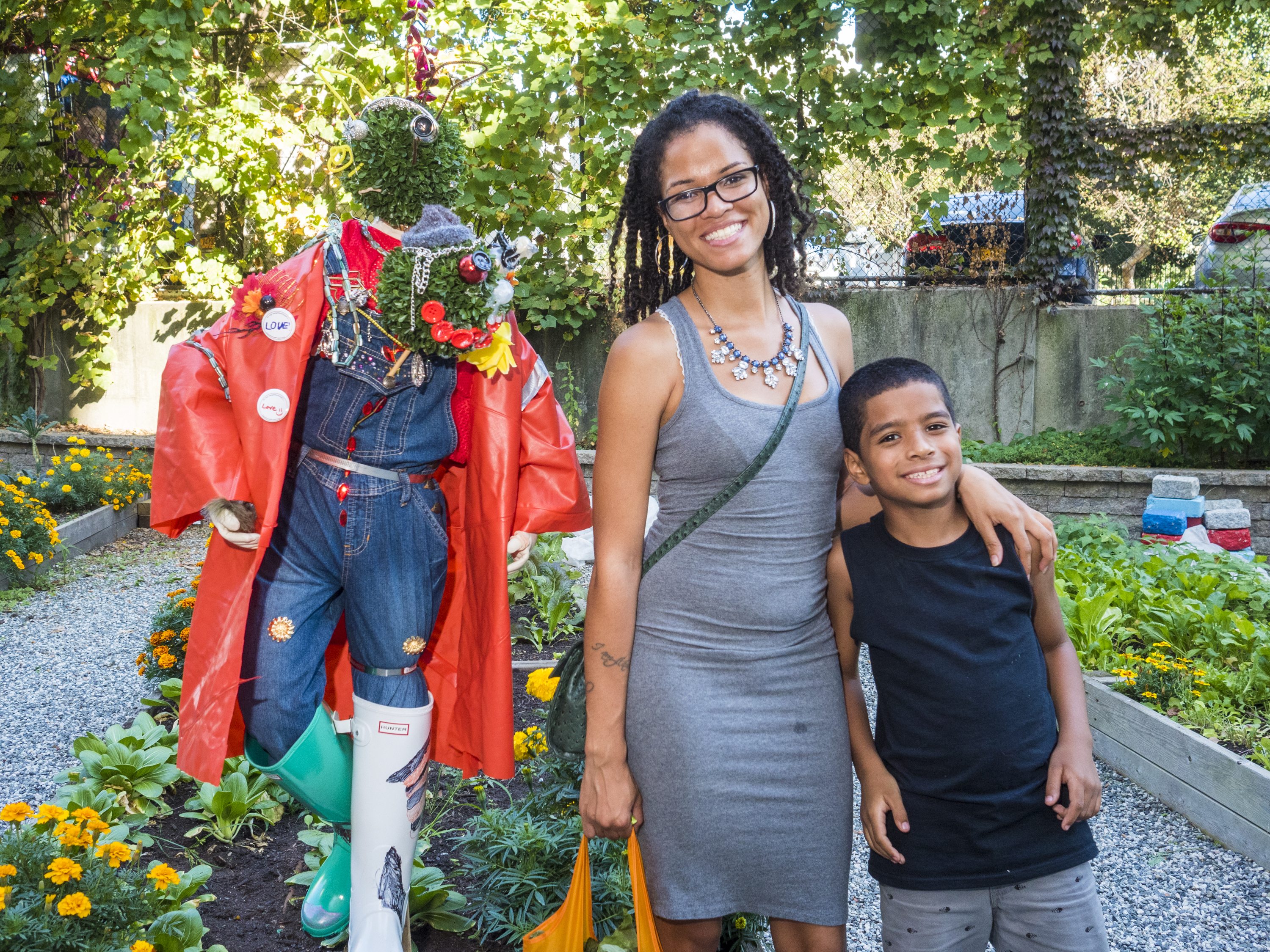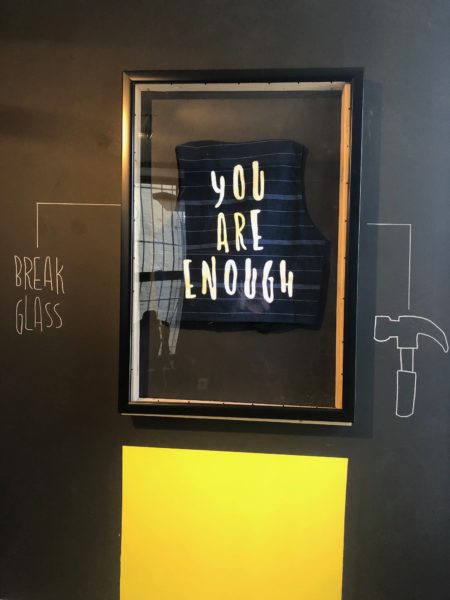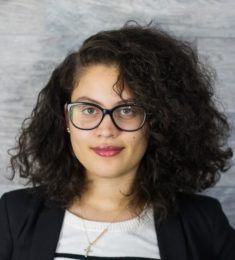As part of The City Amplified research team in the Seminar on Public Engagement & Collaborative Research, independent study student Lauren Capellan interned with community partner The Laundromat Project. Below is Lauren's account of her internship.
Activism in Kelly Street
Truthfully this project began with the selfish tendency of not wanting to go to campus more than once a week. As a college senior, I was ready to get my Bachelor’s degree any way that I could while meeting my requirements for graduation. My intentions were to intern for the Laundromat Project, an organization that my mentor Prithi Kanakamedala was collaborating with through the Mellon Seminar on Public Engagement and Collaborative Research.
This led to the idea of doing an independent study that met every Saturday and centered on the lives of Bronx residents through arts and activism. In partnership with Workforce Housing Group, the Kelly Street Garden, and Banana Kelly Community Improvement Association, The Laundromat Project’s Kelly Street Initiative was born. They transformed a 2 bedroom-apartment on Kelly Street in Longwood, South Bronx into a thriving creative community hub, with artist studios, arts programming, and community partnerships that allowed the LP to engage the larger Kelly Street community.
The Laundromat Project is a community-based nonprofit arts organization. Their mission is to increase creativity within New York City communities by using arts and culture. Their objective is to bring art into spaces that rarely have outlets for residents, to build relationships, and create change. The Laundromat Project also prides itself on bringing up social, political, and cultural issues regarding these communities. They have achieved this mission and goal by welcoming creative catalysts who serve as connectors to the community while working in spaces that residents are comfortable in. The LP invites its neighbors to conversations around the arts, creative expression, and diversity in race, class, gender, education, and socioeconomic status.
Prior to working with the Laundromat Project, I had limited knowledge of the organization’s mission, location, and community members; I overlooked how transformative and meaningful the experience would actually be. It was more than just fulfilling a graduation requirement. It was about learning and engaging with a community that was eager to welcome newcomers despite facing their own hardships. Ultimately, it was about being a part of something that was bigger than me and that served others.

Arts in the Bronx
Since the November 2016 election, calls to eliminate arts funding have been publicized. More recently, President Donald Trump’s budget proposal for fiscal year 2019 (similar to 2018’s proposal) aimed to cut cultural programs like the National Endowment for the Arts, National Endowment for the Humanities, the Institute of Museum and Library Services and the Corporation for Public Broadcasting that make up 0.02 percent of federal spending. Organizations like the NEA have “funded and supported the arts by giving Americans the opportunity to participate in the arts, exercise their imaginations, and develop their creative capacities.” The NEA allows for nonprofit organizations to continue to thrive in New York City neighborhoods. where they celebrate diverse cultural practices and advocate for equal opportunities to arts in all communities in America. The Laundromat Project is a nonprofit arts organization that has benefitted from the NEA, and its purpose is to create awareness of the creativity in black and brown neighborhoods like Harlem, the South Bronx, and Bedford Stuyvesant.
Laundromat Project Artists & Public Programming
Through this funding, the Laundromat Project has been able to increase influence in those particular neighborhoods. It has also allowed artists to create change socially, politically, and culturally. This semester I was able to work with artists from diverse backgrounds who each had a particular message rooted in activism for community residents.
The first artist I worked with was Walter Cruz, a Bronx native creator, who served as the second Kelly Street Artist-in-Residence. Cruz’s philosophy is based on creating work that “inspires and informs” Black and Brown people. His philosophy helped inspire the installation “In Case of Negativity.” Cruz describes his idea process as a visceral moment. He recalls his frustrations at the murders of numerous unarmed black people in late 2016. For the black and brown community, this was an emotional period of anger and feelings of defeat. Cruz remembers watching the news and seeing another police officer not being indicted for their crimes. He looked up and spotted one of his jackets sticking out of the closet. He stated “I just remember grabbing it, painting Black Lives Matter down the back and heading to city.” While walking around, he shared that “folks were giving me smiles, yelling from across the street 'That’s right!' or offering high fives.”
His jacket paintings became increasingly popular amongst his Instagram followers which he eventually shared at the LP space. His intention was to activate the once all white space in a more interesting way than just hanging jackets on a wall. Walter decided to paint the space black while adding splashes of bright yellow. He also housed his jackets in emergency-like cases that that were meant to be broken if someone encountered negativity. He also hosted a public program that allowed community members and other New York natives to show support. This event encouraged attendees to come up with their own positive intentions in their own lives if negativity ever arose. Being a facilitator and participant in the project allowed me to form two distinct perspectives: the first being the importance of positive affirmations for communities of color and the second being the difficulty in coining your own unique affirmation. The installation promoted ideas of self-expression while creating safe spaces despite adversities. It also offered the idea of a permanent affirmation engraved on your clothing to remind you of your purpose while making others think about how they might interject positivity in their own spaces.
Members of the Laundromat Project like Tijay Mohammed and Sol Aramendi hosted programming sessions where they worked as teaching artists to the community. Tijay’s project “Ubuntu,” an African proverb meaning humanity towards others that is often translated as “I Am Because We Are” in English. His aspiration for this project was to pay homage “to loved ones, neighbors and women in their lives.” The workshop was a form of creative and visual artistry that empowered community members to document their stories through the process of crafting their portraits. Sol Aramendi brought her conception of the Workers Studio to the Laundromat Project to raise awareness on Workers Rights. The workshop was dominated by community children who were drawn to colorful spray paint, stencils, and a large canvas to work on. The activity educated and promoted reflection on the value of daily work. All the artists that I encountered while working with the Laundromat Project had different perspectives; however, they alluded to themes around current social issues.
Sustainability & Food Justice at the Kelly Street Garden
The Kelly Street Garden, a partner to the Laundromat Project, was started in 2014 as a restorative venture. The garden is “located in what has been identified as the poorest congressional district in the United States and the lowest rated county by health in New York State.” Placed behind four affordable housing complexes, the garden serves as an alternative for residents to get access to fresh and healthy foods. It is also a tool for community engagement and providing resources to communities who are lacking them. The garden is a model of food justice where community members are exercising their right to grow, sell, and eat healthy foods.
Working with the Laundromat Project
With the organization working towards amplifying creativity, awareness, and social justice, it is exciting to say that I had a role in it all. Having a multifaceted role that depended on what exactly was going on that day, allowed me to work on a multitude of things that ranged from administrative work like inputting sign-in sheet data to playing ping-pong with the kids from the neighborhood. My role consisted of facilitating activities with the Kelly Street kids to carrying bags of soil to the garden for the Spring Kick off. There was always something to do at Kelly Street which is what initially attracted me to the initiative. It was extremely rewarding working in a community that was open, honest, and welcoming to others. The Laundromat Project’s mission is clearly represented in the Hunts Point area where it enhances community networking, provides ownership and engages community residents with various ideas and perspectives regarding arts and culture. They have expanded their agenda to reach community members and expose them to new ideas revolving around arts, culture, history, and creative expression.

